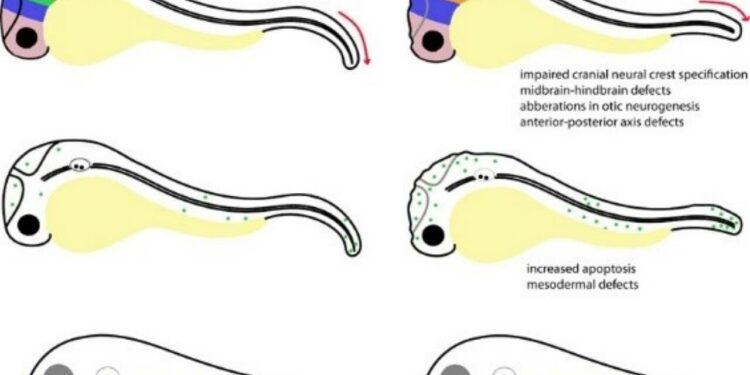Tetrabutylammonium bromide (TBAB) is an industrial reagent commonly found in water bodies – rivers, ponds, and ocean as an industrial by-product. Researchers from the CSIR-Centre for Cellular and Molecular Biology (CSIR-CCMB), Hyderabad; Department of Biochemistry, Panjab University, Chandigarh; and Global Product Compliance─India, Nagpur, have studied the effect of chemical TBAB on embryonic development.
If humans consume TBAB, it causes severe brain diseases and disorders like vertigo, hallucinations, and delirium. However, the extent of environmental risk and TBAB toxicity to human health, particularly embryonic and fetal health, is still not known. This study attempts to understand one aspect of its toxicity using zebrafish as a model.
“Our results show that TBAB exposure to zebrafish embryos results in abnormalities and defects in the brain, inner ear, cartilage and bone of the head. We showed that TBAB exposure alters the embryo’s early brain and ear formation. The long-term exposure of TBAB resulted in bone and cartilage defects in the zebrafish,” says Dr Megha Kumar, the lead researcher.
TBAB is used in many products like fabric softeners, disinfectants, and sanitizers. As a result, it is widely found in water bodies.
“TBAB severely effects embryonic and fetal health,” cautions Dr Kumar.
The team exposed the zebrafish embryos to TBAB dissolved in water. They investigated the expression of genes associated with brain and inner ear development in TBAB-treated zebrafish embryos and compared it with water-treated embryos (control). They also used other molecular biology techniques – real time PCR, cell death assay, and in silico molecular docking to understand the effect of this chemical on different regions of the embryo.
TBAB treatment resulted in aberrations in the specification of the neural crest precursors, hindbrain segmentation, and otic neurogenesis. It also induced a surge in apoptosis in the developing embryo’s head, tail, and trunk regions. According to the researchers, the long-term TBAB exposure may result in cardiac edema and craniofacial defects.
The study highlights how the commonly used industrial reagents such as TBAB may profoundly affect embryonic health. Appropriate remediation measures are required to reduce the levels of such industrial effluents from the environment. Besides Dr Kumar, the team comprised Sharada Iyer (the first author), Neha Dhiman, Suraj P. Zade, Sulagna Mukherjee, and Neha Singla. The study has been published in ACS Chemical Neuroscience. (India Science Wire)


















Discussion about this post